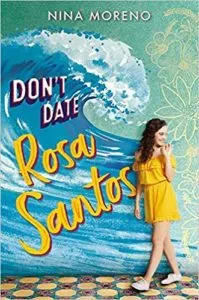
Learning About Cuba Through YA Fiction
This content contains affiliate links. When you buy through these links, we may earn an affiliate commission.
As far as books about Cuba go, a fiction novel is probably not people’s first choice. However, Don’t Date Rosa Santos, a Young Adult book by Cuban American author Nina Moreno, is a must read for those interested in learning about Cuba.
 In Don’t Date Rosa Santos, a Gilmore Girls meets Jane the Virgin love story, Rosa Santos wants to go to Cuba and end her family’s curse. However, her grandmother Mimi, who escaped years ago at the sacrifice of her husband, forbids it.
Reading books about Cuba was not at the top of my list, but I chose this book because I related to the first generation conflicts. So far, Miami-born college student Rosa has only known her Cuban culture through “the food she ate…and stories from the bodega.” As a half Mexican American diaspora, I understand her yearning to feel like she belongs in her country of origin. Further, I relate to Rosa’s diasporic guilt, and her “markers” of feeling Cuban: improving her Spanish and visiting the homeland. While I can visit Mexico whenever I feel like it, until recently Cubans who escaped could not return home.
At first, I thought the plot was a bit far-fetched: both Rosa’s grandfather and father had disappeared at sea? Then I refreshed myself on the famous Elian Gonzalez story, and remembered that his mother had actually drowned at sea trying to escape Cuba. At the time I couldn’t absorb the details, but I always remember the traumatized child crying and screaming on national television.
In Don’t Date Rosa Santos, a Gilmore Girls meets Jane the Virgin love story, Rosa Santos wants to go to Cuba and end her family’s curse. However, her grandmother Mimi, who escaped years ago at the sacrifice of her husband, forbids it.
Reading books about Cuba was not at the top of my list, but I chose this book because I related to the first generation conflicts. So far, Miami-born college student Rosa has only known her Cuban culture through “the food she ate…and stories from the bodega.” As a half Mexican American diaspora, I understand her yearning to feel like she belongs in her country of origin. Further, I relate to Rosa’s diasporic guilt, and her “markers” of feeling Cuban: improving her Spanish and visiting the homeland. While I can visit Mexico whenever I feel like it, until recently Cubans who escaped could not return home.
At first, I thought the plot was a bit far-fetched: both Rosa’s grandfather and father had disappeared at sea? Then I refreshed myself on the famous Elian Gonzalez story, and remembered that his mother had actually drowned at sea trying to escape Cuba. At the time I couldn’t absorb the details, but I always remember the traumatized child crying and screaming on national television.
 In Don’t Date Rosa Santos, a Gilmore Girls meets Jane the Virgin love story, Rosa Santos wants to go to Cuba and end her family’s curse. However, her grandmother Mimi, who escaped years ago at the sacrifice of her husband, forbids it.
Reading books about Cuba was not at the top of my list, but I chose this book because I related to the first generation conflicts. So far, Miami-born college student Rosa has only known her Cuban culture through “the food she ate…and stories from the bodega.” As a half Mexican American diaspora, I understand her yearning to feel like she belongs in her country of origin. Further, I relate to Rosa’s diasporic guilt, and her “markers” of feeling Cuban: improving her Spanish and visiting the homeland. While I can visit Mexico whenever I feel like it, until recently Cubans who escaped could not return home.
At first, I thought the plot was a bit far-fetched: both Rosa’s grandfather and father had disappeared at sea? Then I refreshed myself on the famous Elian Gonzalez story, and remembered that his mother had actually drowned at sea trying to escape Cuba. At the time I couldn’t absorb the details, but I always remember the traumatized child crying and screaming on national television.
In Don’t Date Rosa Santos, a Gilmore Girls meets Jane the Virgin love story, Rosa Santos wants to go to Cuba and end her family’s curse. However, her grandmother Mimi, who escaped years ago at the sacrifice of her husband, forbids it.
Reading books about Cuba was not at the top of my list, but I chose this book because I related to the first generation conflicts. So far, Miami-born college student Rosa has only known her Cuban culture through “the food she ate…and stories from the bodega.” As a half Mexican American diaspora, I understand her yearning to feel like she belongs in her country of origin. Further, I relate to Rosa’s diasporic guilt, and her “markers” of feeling Cuban: improving her Spanish and visiting the homeland. While I can visit Mexico whenever I feel like it, until recently Cubans who escaped could not return home.
At first, I thought the plot was a bit far-fetched: both Rosa’s grandfather and father had disappeared at sea? Then I refreshed myself on the famous Elian Gonzalez story, and remembered that his mother had actually drowned at sea trying to escape Cuba. At the time I couldn’t absorb the details, but I always remember the traumatized child crying and screaming on national television.









